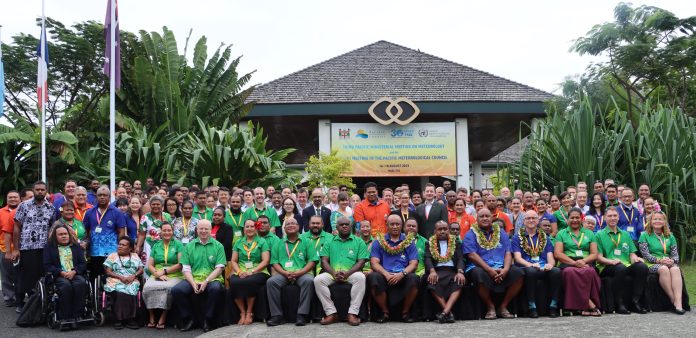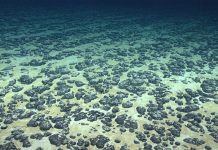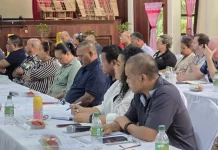The sixth Meeting of the Pacific Meteorological Council (PMC-6), where officials have gathered to discuss and explore opportunities to strengthen weather, climate, water, ocean and related development services in the context of sustainable development, opened in Nadi, Fiji on Monday.
More than 160 delegates observed a moment of silence in respect of the victims of the Maui wildfire in Hawaii that killed more than 90 people. Climate change continues to wreak havoc on the planet where extreme weather events result in lives lost and costing many billions of dollars, with Pacific communities placed at the forefront of its devastating impacts.
Fiji’s Minister for Public Works, Communications, Transport and Meteorological Services, Ro Filipe Tuisawau, welcomed all the delegates to Fiji, and reminded that extreme weather events pose a serious threat to lives in all communities.
“As one of the most disaster-prone areas of the planet, our region is highly exposed and amongst the most vulnerable to a wide range of worsening climate-related hazards such as tropical cyclones, floods, droughts, earthquakes and many more,” Tuisawau said.
“Such extreme events come with cascading hazards such pressure to us all, pushes governments into debt distress, businesses into insolvency, communities and individuals into extreme hardship. These experiences make one thing very clear and that is we need to become more resilient. Improving disaster risk reduction and response is one of the five core principles to strengthen resilience to disasters and our changing climate in the Pacific.”
The PMC-6 precedes the first Development Partners and Donors Engagement Meeting (DPDEM-1) and the third Pacific Ministerial Meeting on Meteorology (PMMM-3) from 14 – 18 August 2023, hosted by the Government of Fiji through the Fiji Meteorological Service.
The meetings attended by Government Ministers, members of the PMC, officials from the Secretariat of the Pacific Regional Environment Programme (SPREP) member countries and territories, development partners, Council of the Regional Organisations in the Pacific (CROP), United Nations’ agencies, collaborating organisations and institutions are guided by the theme: “Sustaining Weather, Climate, Water and Ocean Services for a Resilient Blue Pacific.”
The outgoing PMC Chair,Lealaisalanoa Frances Reupena, who is also the Chief Executive Officer of Samoa’s Ministry of Natural Resources and Environment (MNRE), acknowledged that the past few years have been challenging because of COVID-19, tropical cyclones, volcanic eruptions, tsunamis, storm surges and other extreme weather events.
“However, despite the equally hard and challenging road to recovery we are all going through at the moment, you have stayed the course and remain focused on the critical role of the PMC and our national meteorological services to the security of our people and region,” she said.
“I congratulate the PMC for your bold actions in bringing in our national disaster management offices to be part of the platform, rightly recognising that we do not and should never encourage working in silos but at every opportunity possible, we must work together to deliver common goals. Yes, it will not be easy but we owe it to our people and ourselves to try.”
The Secretary General Representative of World Meteorological Organisation (WMO), Ben Churchill, reminded that there is a need to safeguard communities against a changing climate by investing in adaptation and mitigation measures. He highlighted the value of Early Warnings for All, Greenhouse Gas Monitoring, Regional State of the Climate Reports and Weather Ready Pacific.
“Events such as Hunga Tonga Hunga Ha’apai in January 2022 through to the devastating fires that whipped through Maui, Hawaii, in a matter of minutes last weekend shocked us all to the core and remind us that increasingly we are at the mercy of nature and must prepare ourselves for the unexpected, including rapid escalation of multiple and cascading hazards,” he said.
“I am in constant awe of how these tragic circumstances bring Pacific islanders closer together to help one another and combine relatively limited resources, share experiences and wisdom to build strong and robust and resilient networks and communities. But we still need to do more,” he said.
The Director General of the Secretariat of the Pacific Regional Environment Programme (SPREP), Sefanaia Nawadra, acknowledged the Government of Fiji and the support from all of SPREP’s partners that have made the meeting possible.
He reminded that the PMC has come a long way and emphasised the need for the Pacific nations to have reliable Met Services. A key part of this is the Weather Ready Pacific, a programme which exists to reduce the human and economic cost of severe weather events across the Pacific.
“Weather Ready Pacific is a visionary, ground-breaking ten-year programme of investment that will strengthen the region’s ability to anticipate, plan for, and respond to high-impact and extreme weather, water, and ocean events,” he said.
“All of us need to remind our partners that this is our plan and that we all need to come and work together to implement this plan to align with the goals of our 2050 Strategy for the Blue Pacific continent. Many agencies come with strategies and plans that are good but they are made for global work. The Weather Ready Pacific is how we, the Pacific region, want things to be done.”
The Sixth Pacific Meteorological Council (PMC-6), the First Development Partners and Donors Engagement Meeting and the Third Pacific Ministerial Meeting on Meteorology (PMMM-3) are held in Nadi, Fiji respectively from 14 – 18 August 2023. They follow a range of pre-PMC meetings held in Nadi Fiji from 07 – 12 August 2023.
SOURCE: SPREP/PACNEWS













